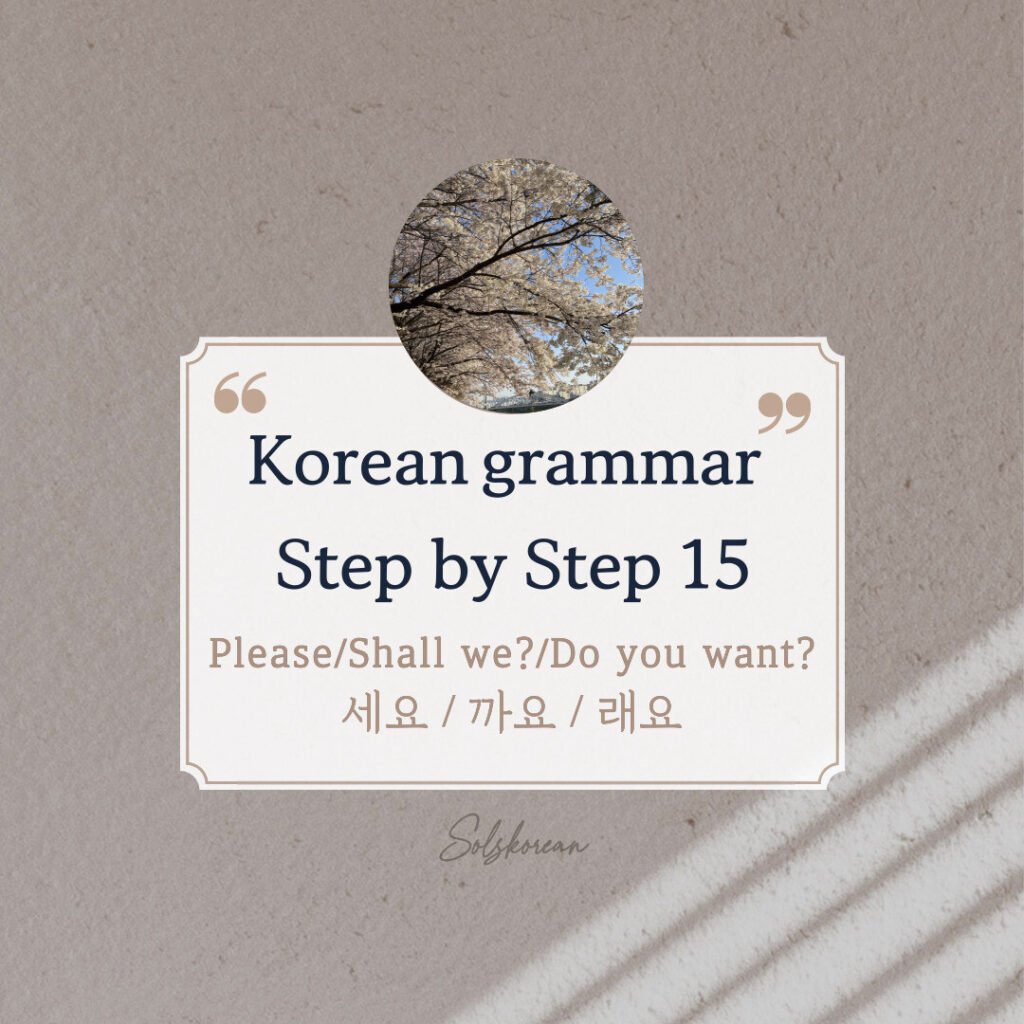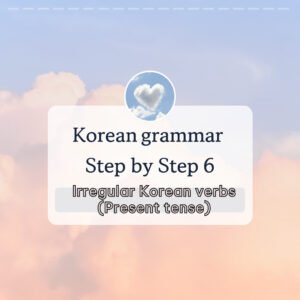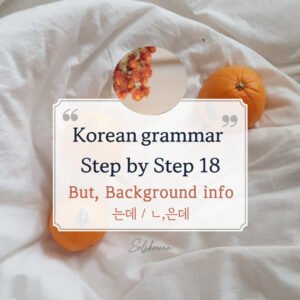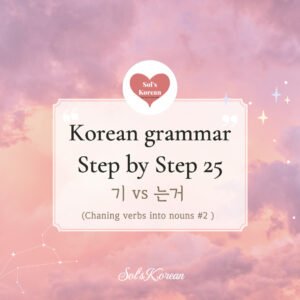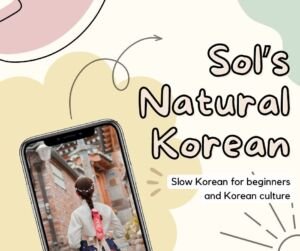(으)세요/을 까요/을 래요 (Question, Suggestion)
Hello, everyone! Today, let’s learn about the Korean grammar points “(으)세요”, “을까요”, and “을래요”.
These three grammar points are frequently used in everyday life for making requests, suggesting ideas, expressing intentions, and more.
Let’s explore their usage and examples.!!
Part 1,
Let’s grasp the concept of grammar
(으)세요: is a polite imperative form used to make requests or give commands politely.
It’s often used when asking someone to do something in a respectful way.
How to Form “(으)세요”
Formation:
For verbs ending in a consonant (except ‘ㄹ’), drop “다” and add “으세요”.
먹다 (to eat) → 먹으세요 (Please eat)
For verbs ending in a vowel or ‘ㄹ’, drop “다” and add “세요”.
가다 (to go) → 가세요 (Please go)
주문하다 (to order) → 주문하세요(Please order)
Verbs ending in “ㄹ”, we will drop “ㄹ” and add 세요.
살다 (to live) → 사세요 (Please live)
만들다 (to make) → 만드세요 (Please make)
Super easy, isn’t it? This grammar is frequently used when placing orders. To say “Can I get… something,” you use the verb 주다 (to give) + 세요 conjugation, which becomes 주세요! (Please give me…)
This grammar is polite, so you can use it in almost every situation. If you prefer a more informal tone, you can simply use the present tense:
주세요 (please give me, polite)
줘요 (Give me, quite informal)
줘! (Give me! very casual)
Examples!
(1) 읽다 (to read) -> 읽으세요. (Please read)
*ending in a batchim, add 으세요
– 책을 읽으세요. (Please read the book.)
(2) 앉다(to sit) -> 앉으세요(Please have a seat)
*ending in a batchim, add 으세요
– 여기 앉으세요. (Please take a seat here.)
(3) 하다(to do) -> 하세요(Please do)
*ending in a vowel, add 세요
– 조심하세요. (Please be careful.)
(4) 웃다(to smile) -> 웃으세요(Please smile)
*ending in a batchim, add 으세요
– 사진 찍을 거예요! 다들 웃으세요. (We are going to take a picture, everybody please smile!)
(5) 자다(to sleep) -> 자세요(please sleep)
*ending in a vowel, add 세요
– 늦었어요. 얼른 자세요! (It’s late, Please go to sleep soon!)
Let’s try conjugating together. Try it on your own first!
(1) 정리하다 (to tidy up / organize)
(2) 취소하다 (to cancel)
(3) 입다 (to wear)
(4) 진행하다 (to proceed / carry out)
(5) 놀다 (to hang out, play)
(6) 보호하다 (to protect / defend)
(7) 읽다 (to read)
(8) 달성하다 (to achieve / accomplish)
Let’s check the answers together!
(1) 정리하다 (to tidy up / organize) : 정리하세요.
– 매일 집을 조금씩 정리하세요.
Clean up your house a little bit every day
(2) 취소하다 (to cancel) : 취소하세요.
– 얼른 취소하세요.
Please cancel it quickly.
(3) 입다 (to wear) : 입으세요
– 정장(을) 입으세요.
(Please) Wear a suit.
(4) 진행하다 (to proceed / carry out) : 진행하세요
– 프로젝트를 진행하세요.
Please proceed with the project.
(5) 놀다 (to hang out / play) : 노세요 (irregular)
* We will drop “ㄹ” and add 세요!
– 강아지랑 노세요.
(Please) Play with the puppy.
(6) 보호하다 (to protect / defend) : 보호하세요.
– 환경을 보호하세요.
Please protect the environment.
(7) 읽다 (to read) : 읽으세요
– 사 페이지까지 읽으세요.
(Please) Read until page 4.
(8) 달성하다 (to achieve / accomplish) : 달성하세요.
– 목표를 달성하세요.
Please achieve the goal.
When this conjugation is used with adjectives, it changes the meaning to “ask someone politely”
Are you hot? (politely) : 더우세요?
(덥다 – ㅂ irregular, 더우 + 세요 -> 더우세요)
Are you busy? (politely) : 바쁘세요?
Are you okay? (politely) : 괜찮으세요?
You can use the simple present tense, like “Are you hot” – “더워요?” but it’s less polite.
ㄹ/을까요 is used to ask someone’s opinion or to suggest something. It can mean “Shall we?” or “Should I?”.
Formation:
For verbs ending in a batchim, add “을까요“.
먹다 (to eat) → 먹을까요? (Shall we eat? / Should I eat?)
For verbs ending in a vowel, add “ㄹ까요“.
가다 (to go) → 갈까요? (Shall we go? / Should I go?)
Similar to “(으)세요” grammar, depending on the final consonant or vowel of the verb, we add “을” or “ㄹ” and “까요“. This grammar pattern is frequently used to ask for someone’s opinion or to inquire about one’s own opinion.
If you simply drop the last part “요”, it becomes casual !
갈까? (Should we go?) – casual
먹을까? (Shall we eat?) – casual
Examples!
(1) 보다 (to watch) -> 볼까요?
*ending in a vowel, add ㄹ and 까요
– 영화를 볼까요? (Shall we/I watch a movie?)
(2) 마시다 (to dirnk) -> 마실까요?
*ending in a vowel, add ㄹ and 까요
– 커피를 마실까요? (Shall we/I drink coffee?)
(3) 찾다 (to find, look up) -> 찾을까요?
*ending in a batchim, add 을 and 까요
– 제가 찾을까요? (Should I go find it?)
(4) 만들다 (to make) -> 만들까요?
*ending in a batchim, add 을 and 까요
– 같이 만들까요? (Should we make it together?)
Second usage of ㄹ/을까요: Expressing Uncertainty or Speculation
This form is also used to express uncertainty or to speculate about something happening in the future, similar to making guesses or predictions.
Examples:
내일 눈이 올까요? (Do you think it will snow tomorrow?)
시험을 통과할까요? (I wonder if I’ll pass the exam, Do you think I’ll pass the exam?)
* 통과하다 to pass / 시험 exam
내 남자친구는 존재할까요? (I wonder if my bf exists, Do you think my boyfriend exists?)
* 존재하다 to exist
우리 엄마는 언제 집에 올까요? (I wonder when my mom will come home. When do you think my mom will come home?)
* 언제 when
걔는 많이 바쁠까? (Do you think he/she is really busy?) – casually.
Good job! Now, let’s dive into the last grammar point for today: ㄹ/을래요!
ㄹ/을래요 is used to express the speaker’s intention or to ask about the listener’s preference.
It can mean “Would you like to / Do you want to?” or “I would like to.”
Formation:

